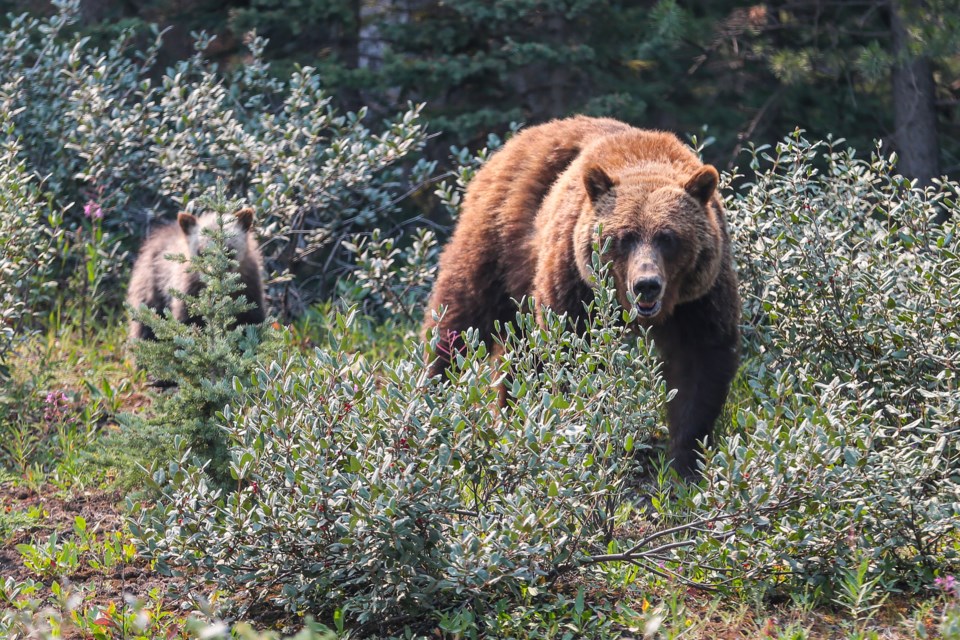BANFF— A public advisory has been issued warning residents and visitors to be extra vigilant as bears feed on buffaloberries – their prime food source in Banff National Park this time of year.
Also known as shepherdia, the fruit-bearing shrubs are a critical high-calorie food source for bears, however the start of the berry season in the national park is not shaping up well compared to last year’s bumper crop.
“It’s certainly not a disaster, but it’s sort of fair to below average, a bit more spotty and not as abundant as last year,” said Dan Rafla, human-wildlife management specialist for Banff National Park.
“What this will likely mean is that bears are going to have to travel further afield and moving across the landscape looking for food to get as many calories as they can.”
Buffaloberries are the single most important source of calories for bears in the mountain national parks of Alberta. Focused with their heads down, grizzly bears can eat up to 100,000 buffaloberries a day and large male grizzlies can devour double that.
They can also eat for up to 20 hours a day later in the season as they enter hyperphagia, a period of intense eating where bears forage around the clock to put on fat for winter’s hibernation.
In the mountain parks, the season for buffaloberries – which are bright red, yellow and orange and measure about four millimetres wide – typically runs from mid-July to September.
Bushes thrive in open areas and along the edges of trails, meadows, rivers and streams, as well as human development, and as bears focus on feeding, it’s easier to surprise them.
Rafla said bears are starting to slowly shift in their annual cycle in August and September and into fall.
“They’ve done their other responsibilities from giving birth to the breeding season and now we’re going to start to shift to a period where bears need to feed and put on weight,” he said.
“Now’s the time to be a bit more vigilant because bears are more focused on food and are not paying as much attention to you and so it’s important to be very aware of your surroundings.”
The buffaloberry crop sizes vary from year to year.
A 2019 University of Calgary study predicted climate change could lead to a shortage of buffaloberries in the Rocky Mountains in the next 60 years in the critical months for bears before hibernation.
The study, which was published in the scientific journal Nature Climate Change, predicted buffaloberries would ripen three weeks earlier than they do now, and up to 40 days earlier at higher elevations, under climate change projections.
Researchers indicated this would have major implications for grizzly bears, widening the gap between the availability of this calorie-rich seasonal food and the time when bears head into their dens.
As for this year’s buffaloberry crop, Rafla said there are likely many factors at play, noting the record high temperatures and lack of rain are likely just one part of a more complicated picture for the fruit-bearing shrubs.
“The phenology of these plants is a little more complex than to just one heat event, although that’s going to have an affect on plants and be a stressor,” he said.
Meanwhile, Parks Canada advises people carry bear spray, ensure it is accessible and know how to use it.
They also ask people make lots of noise when on hiking or biking on trails, do not wear earbuds, keep dogs on leash at all times and watch for fresh bear sign such as scat, especially near berry patches.
“We’re starting to see a few bear scat filled with berries so try to avoid these areas,” Rafla said.
Parks Canada also reminds residents and visitors to properly store garbage and food in residential yards, businesses, day-use areas, picnic sites or front country and backcountry campgrounds.
All bear sightings should be reported to 403-762-1470.
“It might be a bit more of a challenging year for bears, so give them space, be aware and be respectful,” Rafla said.




